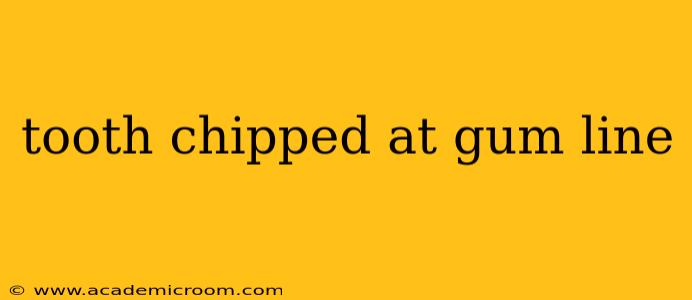A chipped tooth at the gum line can be a painful and unsightly problem, impacting both your smile and your oral health. This area is particularly sensitive because it's close to the nerve and often involves a larger portion of the tooth structure than a chip higher up. Understanding the causes, treatment options, and preventative measures is crucial for addressing this issue effectively.
What Causes a Tooth to Chip at the Gum Line?
Several factors can lead to a chipped tooth at the gum line. These include:
- Trauma: This is the most common culprit. A blow to the mouth from a sports injury, fall, or accident can easily fracture a tooth, especially near the gum line where the tooth is more vulnerable.
- Bruxism (Teeth Grinding): Chronic teeth grinding, often done unconsciously during sleep, can gradually wear down tooth enamel, making them more susceptible to chipping, particularly at the gum line where the forces are concentrated.
- Worn Enamel: Naturally thin enamel or enamel weakened by acidic foods and drinks makes teeth more prone to chipping.
- Decay: Extensive tooth decay can weaken the tooth structure, making it more vulnerable to fracturing, especially near the gum line.
- Underlying Dental Conditions: Certain dental conditions like periodontal disease (gum disease) can weaken the support structure of the tooth, increasing the risk of chipping.
How is a Chipped Tooth at the Gum Line Treated?
Treatment depends on the severity of the chip and the overall health of the tooth. Options include:
- Dental Bonding: For minor chips, a dentist can use a composite resin material that matches the color of your teeth to repair the damage. This is a relatively quick and inexpensive procedure.
- Dental Veneers: If the chip is more significant or affects the tooth's aesthetics, veneers might be recommended. These thin, custom-made shells are bonded to the front surface of the tooth to improve its appearance and protect the damaged area.
- Crown: For larger chips or severely damaged teeth, a crown (a cap that covers the entire tooth) may be necessary to restore its strength and shape. This is a more involved procedure but provides excellent protection and durability.
- Root Canal: If the chip exposes the nerve (pulp) of the tooth, a root canal may be required to remove the infected or damaged pulp before further treatment like a crown can be done. This prevents infection and saves the tooth.
- Extraction: In severe cases where the tooth is beyond repair, extraction might be the only option.
What if I have a small chip? Do I need to see a dentist immediately?
While small chips might not seem urgent, it's always best to consult a dentist. Even a small chip can lead to further damage, sensitivity, or infection if left untreated. Early intervention often leads to simpler and less expensive treatments.
How much does it cost to fix a chipped tooth at the gum line?
The cost of repairing a chipped tooth varies significantly depending on the extent of the damage, the chosen treatment method, and your location. It's best to schedule a consultation with your dentist for an accurate cost estimate.
Can I prevent my teeth from chipping at the gum line?
Yes, several preventative measures can significantly reduce your risk:
- Wear a Mouthguard: If you participate in contact sports, always wear a properly fitted mouthguard to protect your teeth from impact.
- Avoid Hard Foods: Be cautious when biting into hard foods like nuts, ice, or hard candies, which can easily chip your teeth.
- Manage Bruxism: If you grind your teeth, talk to your dentist about treatments like nightguards to protect your teeth during sleep.
- Maintain Good Oral Hygiene: Regular brushing, flossing, and dental checkups help prevent decay and maintain strong, healthy teeth.
By understanding the causes, treatment options, and preventative measures, you can protect your teeth and address any chips at the gum line promptly and effectively. Remember that timely intervention is crucial for preserving your oral health and achieving the best possible outcome. Consulting a dental professional is always recommended for accurate diagnosis and personalized treatment planning.
